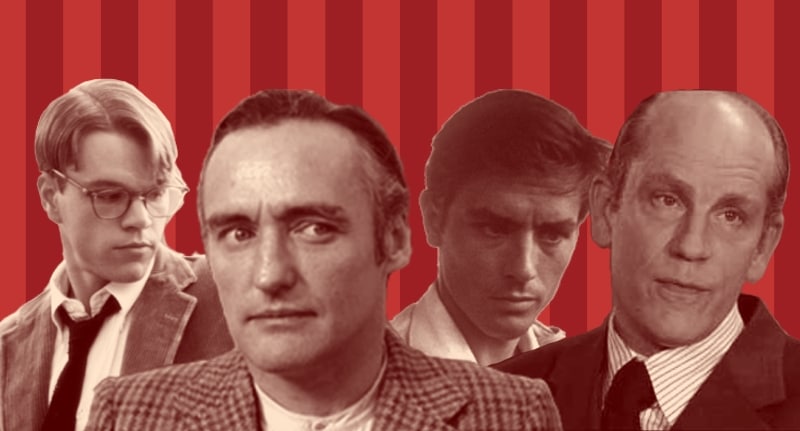
Frank Abagnale Jr. from Catch Me if You Can is incredibly suave, Johnny Hooker and Henry Gondorff from The Sting are an unforgettable duo, and Lawrence Jamieson and Freddy Benson’s scheming in Dirty Rotten Scoundrels is classic. But has there ever truly been a con artist greater than Tom Ripley?
The iconic character was created by Patricia Highsmith in 1955. He is said to be the novelist’s personal favorite of her creations. She went on to write five books about him, known as The Ripliad. Since his creation, Tom Ripley has been brought to life in a number of ways over the years in many memorable iterations. Namely, by Alain Delon in Purple Noon (1960), Dennis Hopper in The American Friend (1977), Matt Damon in The Talented Mr. Ripley (1999), and John Malkovich in Ripley’s Game (2002).
Each portrayal of Tom Ripley has been vastly different. These four actors have little in common, and these are all stand-alone movies, not a Ripley franchise. So, which actor makes the best Tom Ripley? And not in the sense of the most faithful adaptation, or the best movie in general, but rather, which actor created the most compelling portrayal of the cunning criminal? Let’s investigate.
For a little bit of background, both Purple Noon and The Talented Mr. Ripley are adaptations of the first Ripley novel, “The Talented Mr. Ripley”. Each film presents a different approach to Tom’s first big con: that on Dickie (known as Philippe in Purple Noon) Greenleaf. The basic story is that Tom befriends Herbert Greenleaf, a rich shipping magnate, by pretending to have been friends with his son, Dickie. Herbert then pays Tom to go to Europe and retrieve Dickie, who has been galavanting around the Italian coast with his girlfriend, Marge. Once Tom arrives in Italy he is seduced by Dickie’s carefree lifestyle. He eventually kills the young man and assumes his identity.
On the other hand, The American Friend and Ripley’s Game are adaptations of the novel “Ripley’s Game”, the events of which take place around 20 years after those of “The Talented Mr. Ripley”. In these two movies, Tom is now a wealthy dealer of forged art. When a criminal friend of Ripley’s asks him to perform a hit, Ripley declines. However, later on, when an innocent acquaintance, Jonathan, insults Tom, he gives his mobster friend Jonathon’s name and suggests he try to convince Jonathan to perform the hit. This is Ripley’s sly plan to ruin Jonathan’s life as revenge for slighting him.
Alain Delon in Purple Noon
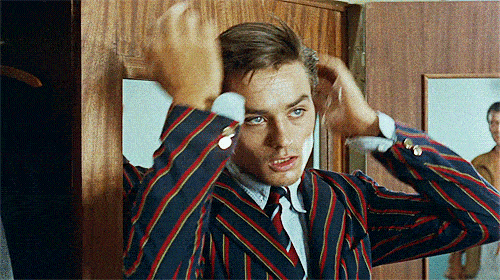 Delon was the first to play Ripley in 1960. What immediately stands out about his portrayal is the fact that Delon was arguably the most attractive person on planet earth at the time of filming. This doesn’t detract from his performance necessarily, but perhaps he would’ve been better off playing Philippe. It’s a little hard to buy that someone who looks like Alain Delon would want to be anyone other than Alain Delon. This is a minor gripe though because, in the end, the thing Tom really wants is to have some wealth and status in society.
Delon was the first to play Ripley in 1960. What immediately stands out about his portrayal is the fact that Delon was arguably the most attractive person on planet earth at the time of filming. This doesn’t detract from his performance necessarily, but perhaps he would’ve been better off playing Philippe. It’s a little hard to buy that someone who looks like Alain Delon would want to be anyone other than Alain Delon. This is a minor gripe though because, in the end, the thing Tom really wants is to have some wealth and status in society.
Delon’s Ripley has murderous intentions from the get-go. He’s weaseled his way into Philippe’s life and he’ll stop at nothing to get everything the Greenleaf heir has. In Purple Noon, Ripley’s first murder is purely the result of malicious intent and selfish gain. He, therefore, should be a pretty unsympathetic character. But this is where Delon’s sharp good looks come in handy. Even if you don’t want to sympathize with his Ripley you still want him to get away with whatever trouble he gets in. Why? Because he just looks so damn cool doing it.
Another thing about Delon’s portrayal is that his Ripley doesn’t seem as talented as the others. After he kills Philippe, we see him struggle to master forging Philippe’s signature. In another scene, he hand delivers Marge a letter he’s forged and tells her it’s from Philippe. The second she opens the note, however, she points out a handful of suspicious things about it and questions whether the letter is truly from her fiance. These are rookie mistakes, Tom. These imperfections actually work well for Delon’s portrayal, though. In between scenes of detached brutality, these moments make us feel for Delon’s Ripley because he sometimes comes off as, simply, a kid trying his best.
Purple Noon also introduces an interesting love triangle that humanizes Tom a bit more depending on how convinced you are by his feelings for Marge. By the end of the film, he’s created a fake will for Philippe, bequeathing all of Philippe’s money to Marge. After she inherits the money, Tom swiftly seduces her. Presumably, his romantic intentions are motivated by riches. Though, since there are definitely more efficient ways he could’ve thought up to make away with Philippe’s fortune, he likely did have a heart and some real loving feelings for Marge after all.
The combination of tender and potentially genuine scenes of Tom and Marge with ones where Tom kills a man then makes a chicken dinner while a dead body remains on the floor of the foyer, give Delon the opportunity to create a very nuanced character in his turn as Tom Ripley.
Finally, my only real problem with Purple Noon is the ending. Simply put, Tom getting caught doesn’t feel in-keeping with the spirit of Tom Ripley. Tom should always be about two seconds away from being found out. He’s a free man at the end of the other three movies. As the truly talented con artist we believe him to be, he should be able to sweet talk his way out of anything. When the film ends with Marge discovering a gigantic error Tom made that will expose all of his deceit, it ruins the fun a little bit. Despite this, Delon truly makes the role work and he casts a hypnotic spell with his performance.
Ripley Rating:
Is he charming? 10/10 YES!
Is he talented? 6/10 Talented enough.
Is he scary? 7/10 He’s pretty scary.
Is he sympathetic? 6/10 Debatable…
Best moment: Joue pour moi
Matt Damon in The Talented Mr. Ripley
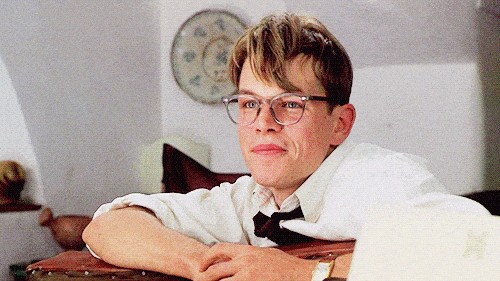 Damon as Ripley is great casting. He’s handsome but in a boyish way with a goofy smile and big chunky glasses. The brilliance of Damon’s performance is all in his expression. His smile always lingers a little too long and his gaze is always a little too intense. On the surface, he seems like a perfectly normal guy, but there’s something off about him.
Damon as Ripley is great casting. He’s handsome but in a boyish way with a goofy smile and big chunky glasses. The brilliance of Damon’s performance is all in his expression. His smile always lingers a little too long and his gaze is always a little too intense. On the surface, he seems like a perfectly normal guy, but there’s something off about him.
Damon’s chemistry with Dickie Greenleaf, portrayed by Jude Law, is explosive. He’s obsessed with Dickie’s joie de vivre and extravagant yet vagabond lifestyle, but also with Dickie himself. Ripley’s desire and infatuation with his friend permeate every frame. He’s head over heels for him in every sense of the word.
The big improvement from Delon’s Ripley to Damon’s is the Tom-Dickie relationship. In Purple Noon, Delon’s Ripley always intended to kill. He has no genuine feelings or attachment to Philippe and this makes him much more insidious. On the other hand, Damon’s Ripley is both in love with Dickie and consumed by a desire to become him. He only kills for the first time when he’s pushed to the edge. Though, once he begins the act, he’s frighteningly capable.
Damon’s Ripley murdering Dickie is pretty heartbreaking. The act is prompted by Dickie making it clear he will soon be discarding Tom, of whom he’s grown tired, while Tom pleads with him and hints at what he believes to be their true feelings for each other. Unable to reconcile with the possibility of returning to his old, pre-Dickie, penniless lifestyle, he snaps and viciously kills Dickie with an oar. Then he lies down next to Dickie’s lifeless body and holds him, for god knows how long, as their small boat aimlessly drifts in the ocean.
This scene works on many levels. On one hand, Damon’s Ripley might be even scarier than Delon’s if he was able to do something so awful to someone he supposedly loves. But also, maybe less so since he had, in a sense, more respectable motivations. Also, he’s clearly torn apart, at least initially, over what he’s done.
Damon’s Ripley is also probably the most Talented iteration of Ripley. We don’t really actually see him hone any of skills, we just know he’s already mastered everything. The way he impersonates people with alarming ease and the intense charisma and gusto he throws behind each lie he tells is phenomenal. Damon perfects the important Tom Ripley balance, which is that he makes us cheer for Tom and care for him even though he’s truly terrifying. Every time he evades capture with another lie that seemingly came out of nowhere, we breathe a sigh of relief.
“I always thought it would be better to be a fake somebody than a real nobody. “
Tom’s intense desire to be someone more than who he is and the fact that he seems to genuinely have loving feelings for others but lacks a way to healthily express or deal with them makes him perhaps the most sympathetic Ripley as well.
Ripley Rating:
Is he charming? 9/10 Incredibly.
Is he talented? 10/10 Extremely.
Is he scary? 9/10 A Resounding yes.
Is he sympathetic? 10/10 Very much so.
Best moment: Tu Vuo’ Fa l’Americano
Dennis Hopper in The American Friend
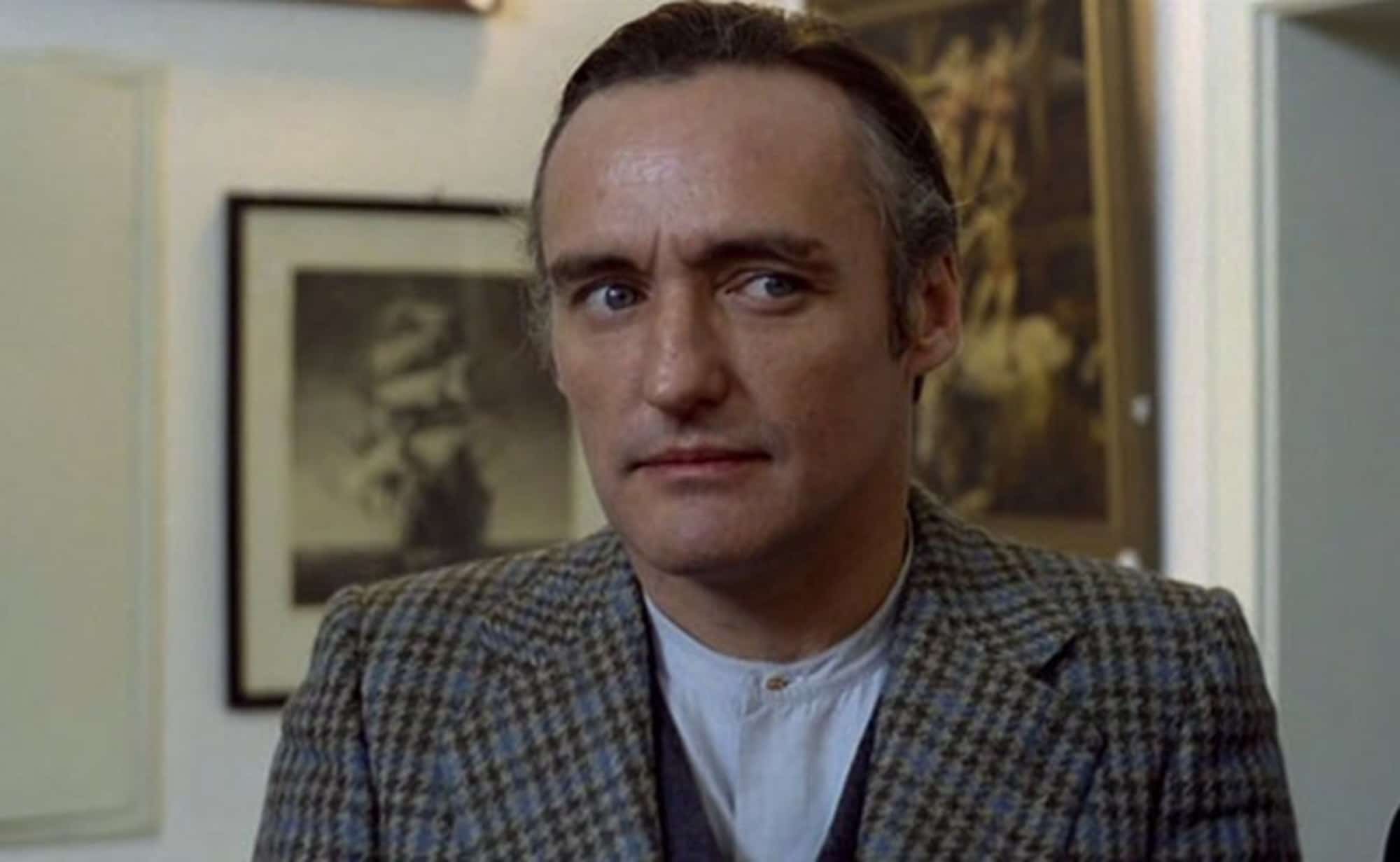
Hopper’s Ripley comes flying out of left field. He could not be less like Damon and Delon’s devilishly handsome killers. This Ripley is like a rogue cowboy on the streets of Hamburg. For one thing, Hopper doesn’t have the conventional, youthful good looks of either of the other performers and, in the way Hopper plays him, he also lacks that Ripley charm and charisma. Though, since I’m not basing this evaluation on whether or not the performance is a faithful adaptation of Highsmith’s books, these startling differences aren’t a detraction.
Hopper gives an excellent and memorable performance. Even though his Ripley at first seems to be the antithesis of Tom Ripley, he pulls off… something. He’s got a certain (terrifying) je ne sais quoi.
From the first scene, Hopper establishes his Ripley as simply creepy. He lives alone in a giant house in Hamburg. For some reason, he has a huge bed with bright red sheets. He records nonsensical notes to himself.
“I know less and less about…uh… who I am…or who anybody else is…”
Eventually, when dealing in forged art, an innocent acquaintance, Jonathan (Bruno Ganz), insults one of Ripley’s paintings. In a bizarre, and intense overreaction, Ripley names this man to a friend of his who’s looking for someone to perform a hit, implicating the relative stranger in a game of danger and murder.
This depraved act and the fact that Hopper’s Ripley doesn’t really seem to have anyone in his life that he cares about makes this Ripley the least sympathetic of all. He seems to be screwing people over just for the hell of it now and he kills with such ease that you can tell his body count must have skyrocketed over the years. Long gone are the days of only killing to get out of a bind.
The final sequence of the film also cements how frightening Ripley is. He is no longer suave or charming. Instead, he is frighteningly unhinged. The moment when he sets a car on fire and then chases after Jonathan and his poor wife is haunting.
Hopper, as always, is a magnetic performer and though his interpretation of Ripley may not be the most layered, the performance will stay with you after you watch The American Friend. Somehow, he’s inextricably linked himself to the character in my mind.
Ripley Rating:
Is he charming? 6/10 A little lacking in this department.
Is he talented? 9/10 Extremely.
Is he scary? 10/10 Horrifying.
Is he sympathetic? 2/10 Barely.
Best moment: Let me take a selfie
He’s so creepy! Why does he need so many Polaroids of himself?!
John Malkovich in Ripley’s Game
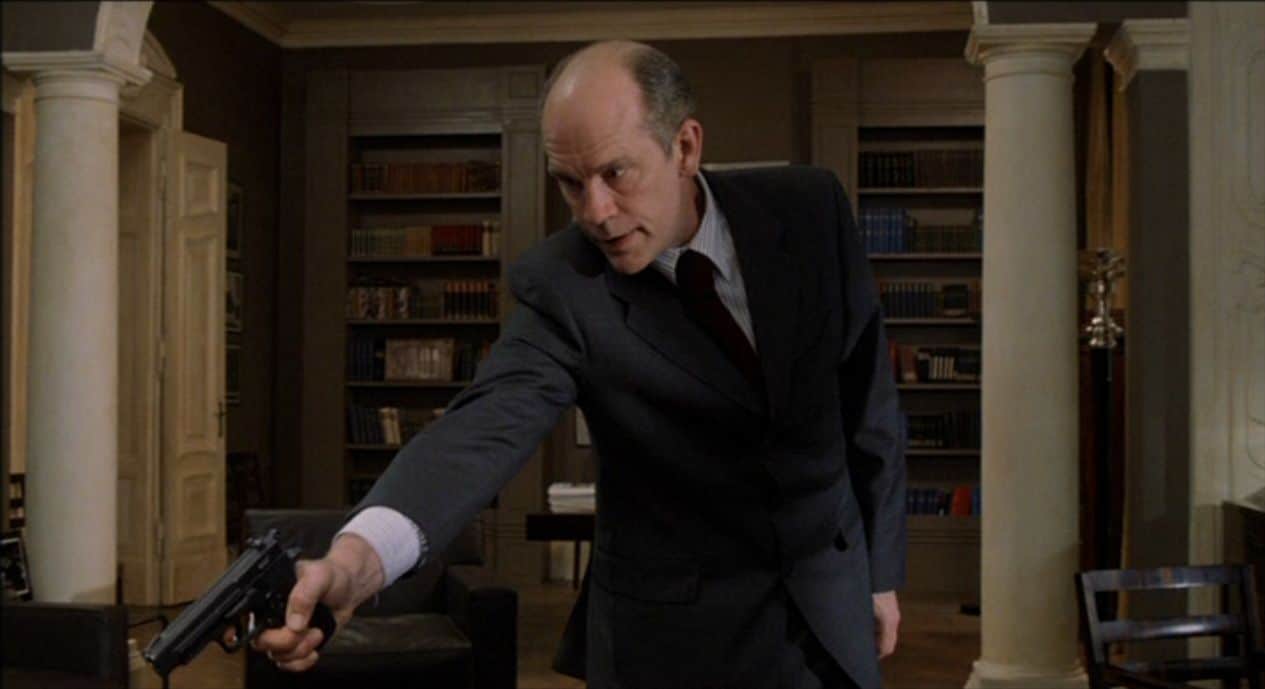
Finally, we have Malkovich’s Ripley. He’s more in keeping with the view of Ripley that Damon and Delon laid out for us than Hopper’s mysterious loner.
Unfortunately for Malkovich, he’s probably the least memorable of the four Ripley’s. Though, I’d blame this on the overall quality of the movie compared to the other three and not Malkovich’s performance. There is a lot to be admired in the subtleties of Malkovich’s rendition of Ripley. He finds the perfect middle ground between the charm and charisma of Damon and Delon and the bitter cruelty of Hopper’s lone wolf.
The film starts off with Malkovich’s Ripley brutally murdering someone for, essentially, looking at him the wrong way during a business deal. The thing that’s so arresting about this scene isn’t Ripley’s short fuse, but the way that he maintains such a calm and collected temperament. Malkovich is so soft-spoken. It’s not that he’s shy, but it’s the way that he speaks so delicately as if he’s choosing every specific word with intense care, just for you. When you combine this with his illogical cruelty, Malkovich creates a Ripley that might not be the first to pop into your head when you think of the character, but that will always be there in the back of your mind.
“You know the most interesting thing about doing something terrible? Often, after a few days, you can’t even remember it.”
Malkovich’s Ripley is also interestingly the only one who seems to have a healthy human relationship of any kind. He has a beautiful young wife and they genuinely seem to have a good marriage. He’s even honest with her about his criminal activity. Near the end of the film, the second after he disposes of a body, he immediately gets on the phone with his florist to order flowers for his wife’s upcoming concert. Cute, right? This is a big jump from Delon’s potentially fraudulent seduction of Marge and Damon’s tragic and dangerous obsession with Dickie. It’s also an obvious step up from Hopper’s lonely nights in his Hamburg estate.
By actually showing Tom as a person who can have a genuine relationship, Malkovich succeeds at making us care about him more, while also wondering if this side to him was really there all along or if it’s simply something he eventually mastered playing at along the way…
Ripley Rating:
Is he charming? 9/10 Very.
Is he talented? 9/10 Extremely.
Is he scary? 10/10 Very much so.
Is he sympathetic? 6/10 Kind of…
Best moment: Due to the volatility of the market…
The Winner
To cap off this deep dive I’d like to bestow the title of best Tom Ripley upon Matt Damon. He has the winning combination of boyish good looks, tons of charm, a breadth of sneaky skills, and a heartbreaking unrequited love story. He truly strikes the perfect balance between frightening and sympathetic. Of all the Ripleys, Damon does it best.
Whichever Ripley you prefer, I think we can all agree that the variety in these four interpretations of the character is what makes Tom Ripley so special. These movies complement each other fantastically. When analyzed all together, they stay true to the nature of the sociopathic con man. Even across films, across decades, you can’t pin Tom Ripley down. You’ll never know who he really is.
On that note, if anyone out there has 8 hours to burn, I recommend these movies as a quadruple feature in the following order: Delon, Damon, Malkovich, then Hopper.
Also, with a TV show about Ripley in development, and with myself feeling like a certified Ripley scholar after researching and writing this, I would like to take this opportunity to humbly propose that Lucas Hedges be the next to take on the role of Tom Ripley. I think he’d give Damon a run for his money.
Related Topics: Alain Delon, Dennis Hopper, John Malkovich, Matt Damon, Tom Ripley

